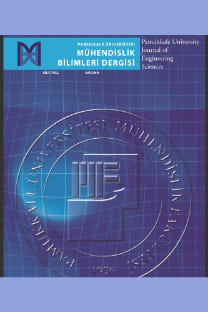Farklı Tip ve Miktarda Puzolan İçeren Kendiliğinden Yerleşen Betonun Dayanımı ve Elastisite Modülü Arasındaki İlişki
Bu çalışmada, farklı oranlarda uçucu kül ve silis dumanı ikameli kendiliğinden yerleşen beton (KYB) karışımlarına ait basınç, çekme dayanımı ve elastisite modülü değerleri arasındaki ilişki araştırılmıştır. KYB karışımları için çökme-yayılma, t500, L-kutusu ve elek ayrışma işlenebilirlik deneyleri gerçekleştirilmiştir. Üretilen numuneler kalıptan alındıktan sonra, toplam 28 gün süreyle 20±2 ºC suda kür edilmiştir. Her bir beton özelliği için 3'er numune kullanılarak, basınç ve yarmada çekme dayanımı ve elastisite modülü deneyleri yapılmıştır. Bu deneylerden elde edilen çok sayıda veri kullanılarak yapılan regresyon analizi sonucu bulunan basınç dayanımı-çekme dayanımı ve basınç dayanımı-elastisite modülü bağıntıları önceki çalışmalara ait bağıntılarla karşılaştırılmıştır. Sonuçta, bu çalışmadan elde edilen basınç-çekme dayanımı ve basınç dayanımı-elastisite modülü bağıntılarının yüksek dayanıma sahip kendiliğinden yerleşen betonların çekme dayanımını ve elastisite modülünü doğru tahmin etmede kullanılabileceği sonucuna varılmıştır.
Relationship Between Strength and Elasticity Modulus of Self-Consolidating Concrete Containing Different Types and Dosages of Pozzuolana
In this study, relationship between strength (compressive strength, tensile strength) and elastic modulus of self-consolidating concrete (SCC) that included different types and dosages of mineral admixtures (fly ash (FA) and silica fume (SF)) as replacement of Portland cement was investigated. In order to evaluate the workability of the mixtures, slump-flow, t500, L-box and sieve segregation tests were carried out. In the following day of casting, the specimens were de-moulded and located in 20±2 ºC water and cured for 28 days. Compressive strength, splitting tensile strength and elastic modulus tests were performed using a total of 3 specimens for each concrete property. Compressive strength–tensile strength and compressive strength-elastic modulus formulas obtained from regression analysis using a numerous data were compared with the equations obtained in the previous studies. Consequently, it was found that compressive strength–tensile strength and compressive strength-elastic modulus formulas obtained from this study can be used correctly to estimate the tensile strength and the elastic modulus of self-consolidating concrete.
